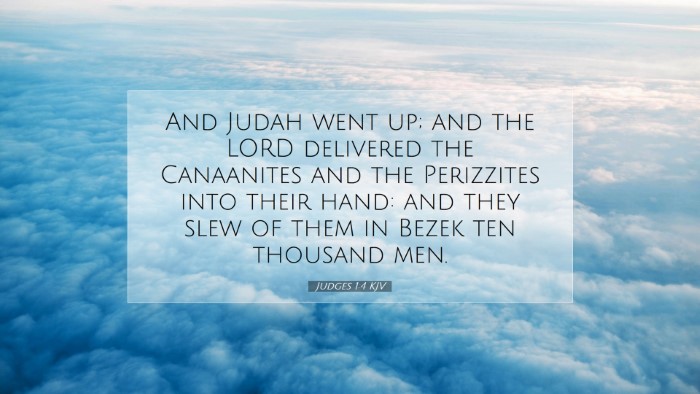Commentary on Judges 1:4
Judges 1:4 states: “And Judah went up; and the Lord delivered the Canaanites and the Perizzites into their hand: and they slew of them in Bezek ten thousand men.”
Historical Context
This passage occurs in the context of Israel's conquest of Canaan following Joshua's death. The book of Judges narrates the stories of various leaders (judges) in Israel after the initial conquest. Judah's ascendance as a tribe is significant, illustrating God’s continued guidance and the hope of Israel during a period marked by disarray.
Spiritual Significance
The verse highlights the theme of divine assistance in the success of Judah's endeavors. The victory is attributed directly to the Lord's intervention, emphasizing a recurring biblical principle that God empowers His people to achieve His purposes when they act in faith and obedience.
Commentary Insights
-
Matthew Henry:
Henry emphasizes the importance of Judah’s movement to take initiative in the conquest. He notes that the participation of divine aid in their victory is paramount (“the Lord delivered…”), indicating that success in spiritual endeavors requires reliance on God. He elaborates on Judah's victorious outcome in Bezek, drawing parallels to the need for believers today to strive forward with the assurance that God is with them in their pursuits.
-
Albert Barnes:
Barnes provides an analytical view regarding the geographical and sociopolitical implications of the victory. He details how the defeat of the Canaanites at Bezek symbolized a significant territorial gain that was essential for Judah's future dominance. He notes the significance of numbers—“ten thousand men”—as indicative of the scale of the challenge Judah faced and the bountiful nature of their triumph. Barnes stresses that this battle’s success is a testament to God’s faithfulness to Israel despite the ever-present threat posed by the Canaanites.
-
Adam Clarke:
Clarke focuses on the narrative mechanics and the implications of the tribes working in unity. He observes that Judah's actions are also a model for all Israel, showing the necessity for collective engagement in spiritual battles. Clarke argues that each tribe had its role within the greater picture of Israel’s covenant loyalty, and he highlights that the successes attributed to Judah offer profound lessons on divine partnership and interdependence among believers.
Theological Reflections
This verse, while narrating a historical event, opens avenues for theological exploration. The idea of God delivering enemies into the hands of His people resonates with the broader biblical theme of divine sovereignty and favor. It invites ongoing contemplation on contemporary spiritual struggles faced by believers and the assurance of God's presence in confronting adversarial forces.
Practical Applications
For pastors, this passage can serve as a powerful reminder to encourage congregants about the necessity of trusting God in moments of challenge. For students and theologians, it provides an opportunity for exegesis that leads to better understanding of the nature of divine assistance in human endeavors. Scholars might explore the implications of collective action in faith communities as seen through Judah's approach in Judges 1:4.
Conclusion
In conclusion, Judges 1:4 encapsulates a significant moment in Israel's history, revealing God's active involvement in their conquests. The insights provided by commentators such as Henry, Barnes, and Clarke invite further engagement with the text, encouraging believers today to pursue their calling with the assurance that God empowers their efforts. This scripture should inspire renewed faith in the power of God to deliver and aid His people in every circumstance.


